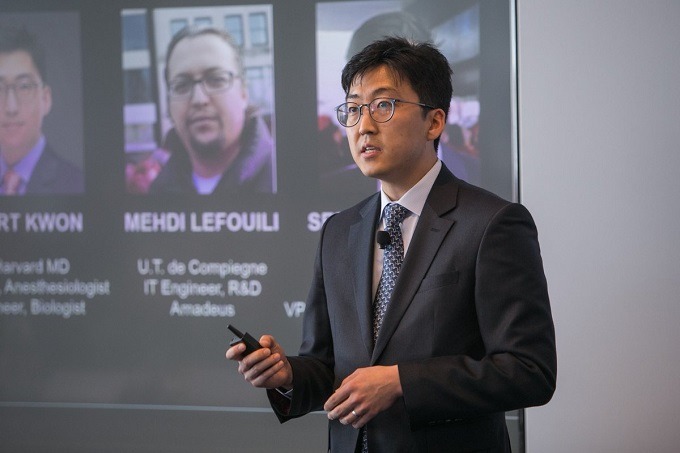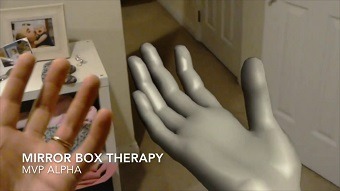 ___
___
Albert, what surprised you the most from the Judges’ questions and feedback during the Brainnovations Pitch Contest?
It was a pleasant surprise to receive so many votes and such great feedback, which solidified my conviction that there is a great need to create new therapy options for stroke patients and other neurological injuries, especially given our aging population. Medical systems worldwide will struggle to handle the growing burden of chronic illnesses unless we start acting soon.
In a nutshell, what is the core idea behind AUGMENTx?
The core idea is to leverage visual-cognitive and visual-motor/sensory connections of the brain to enhance performance in disease states. For example, mirror therapy takes advantage of the mirror neuron pathway to improve post-stroke motor recovery and to alleviate phantom limb pain in limb amputees. And we believe that these therapies can be delivered on digitized AR platforms, instead of being always confined to few specialized physical rehabilitation centers. Why not have them be accessible from the patient’s home, especially in rural areas where there is often no access to any kind of rehab?
 When and how did the idea come to you?
When and how did the idea come to you?
I realized the potential of augmented reality at a hackathon event at MIT, after a grueling 28 hour hospital shift. My co-founders had created a proof-of-concept prototype and presented it to me when I visited the demo station. It was a revelation, since a week prior I had had difficulty finding mirror therapy for a patient suffering from phantom limb pain in my clinic — and the patient ultimately lost interest in going to the one hospital I somehow managed to find. That is when I knew I wanted to help them bring augmented reality into clinical practice.
What’s your vision for Brain Health in 2025 and how do you envision AUGMENTx as part of it?
As a physician, I am certain that Brain Health is and will continue to be the most important medical problem we must address collectively. In 2025, I imagine the pressure to improve brain health outcomes while containing healthcare cost will rise, so I see great opportunities for technologies such as augmented reality, IoT, wearables, and mobile digital therapeutics all contributing to optimizing the healthcare delivery process and benefiting many patients.
How are you funding the company so far, and are you planning to raise funds this year?
The co-founders of ![]() AUGMENTx have bootstrapped our company thus far and successfully built an MVP augmented reality therapy platform that is ready for pilot studies in stroke patients and chronic pain patients; we have even started to sell our therapy platform as a research tool to academic hospitals. However, the projected expense for running our three pilot clinical studies largely exceed our projected sales this year, so we are kicking off our equity seed fundraising as we speak.
AUGMENTx have bootstrapped our company thus far and successfully built an MVP augmented reality therapy platform that is ready for pilot studies in stroke patients and chronic pain patients; we have even started to sell our therapy platform as a research tool to academic hospitals. However, the projected expense for running our three pilot clinical studies largely exceed our projected sales this year, so we are kicking off our equity seed fundraising as we speak.
How do you/ will you validate that your solutions do what they are supposed to?
We are planning three feasibility pilot studies and aim to start recruiting patients in the second half of the year. Our main interest is testing whether our therapy may have the same beneficial outcomes for stroke patients that traditional mirror therapy has, so we are in active discussions with premier academic institutions regarding running our pilot studies with domain experts on stroke motor recovery and post-stroke chronic pain.
Tell us a couple exciting things you’re planning for 2018
Besides the fundraising and clinical studies, we are looking forward to rigorously testing the limits of current smartphones on which we wish to deploy our augmented reality therapy. If we succeed, we expect to bring down the cost of our therapy system by an order of magnitude and allow many more patients to access our specialized neurological rehabilitation therapies at home.
What are some key roadblocks ahead, and how are you planning to address them?
The biggest challenge in medicine is building the appropriate clinical evidence to ensure our approach benefits patients. The co-founders at AUGMENTx knows that this will take significant effort, time, and capital … and we are ready to take on the quite daunting challenge.
If you could go back in time to, say, 5–10 years ago, what advice would you have liked to receive?
At that time, I was a medical student barely keeping up with the immense amount of new medical information I had to digest. I wish someone had told me to look beyond my medical textbooks and to understand the challenges of healthcare delivery systems. I think I would have had a better appreciation of the vast opportunities where technology can create value for healthcare.
Finally, if I may, what do you do to stay sharp 
I exercise regularly and spend two hours weekly doing internet research on topics that spontaneously interest me in the moment, including non-medical topics such as particle physics or ancient Egyptian history. You never run out of interesting things to explore!
___________________________________________________
Dr. Albert Kwon, Co-Founder & CEO of AUGMENTx, is an MIT and Harvard trained biologist, pediatrician, and anesthesiologist. After completing his residencies at Brigham and Women’s Hospital and Boston Children’s Hospital, he will further specialize in pain medicine at Stanford. He has extensive basic science and engineering research experience in drug delivery, tissue engineering and regenerative medicine with pioneering researchers at MIT and Harvard.
Thanks to his great pitch and answers during the 2017 SharpBrains Virtual Summit (slidedeck available below), AUGMENTx was selected as the Top Brainnovation to Improve Brain Health.
{ All Hypnosis Feeds
via SharpBrains https://sharpbrains.com
January 30, 2018 at 02:09PM
No comments:
Post a Comment